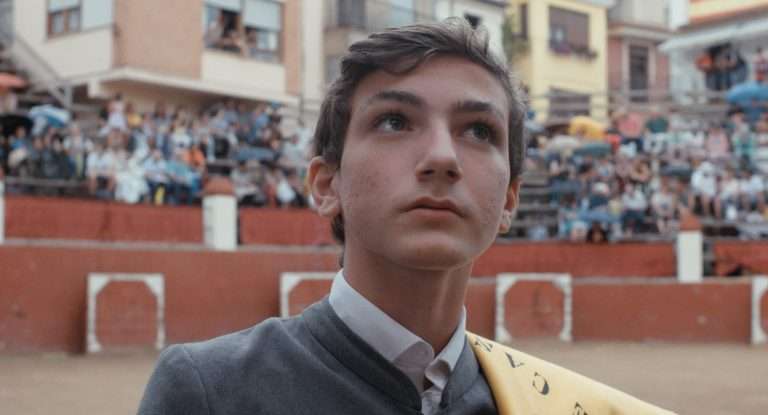The class warfare is such an acute theme in cinema that you can’t pull off fictitious scenarios around it without either sounding crass or villainizing one aspect of it. Bong-joon Ho did the impossible by constructing a maze of deception around it and gave us a somewhat flawless scenario in ‘Parasite.’ However, when a director like Michel Franco did it in ‘New Order,’ he couldn’t hold the barrier to make a bigger point. With ‘Concrete Utopia,’ which is set almost entirely in an apartment building, director Tae-hwa Eom lands somewhere in the middle. Since this is an extreme mash of violence, satire, and the need for survival, the allegory feels palpable but also not totally effective due to the terrible middle-ground it wants to talk about.
Based on Kim Soong-Nyung’s webtoon ‘Cheerful Outcast Part II, Cheerful Neighbour,’ the film opens with the fast-developing metropolis that is Seoul. It shows how, with the boom of capitalistic endeavors, the needs of citizens changed drastically. Having and possessing an apartment not just become a necessity but a status symbol – a proprietary that would give them some semblance in the ever-changing world. It also accurately points out that it wasn’t just about shelter anymore. Owning an apartment meant that you had a superior holding in society. So, when the eventual plot point hits, the dynamic is well-established.
A high-scale earthquake hits Seoul, and every dream and every pathway in sight is brought down to rubble except the Hwang Gung apartment complex that still stands tall among the dilapidated wreckage of concrete. Was it the construction of the building, or just sheer luck that it did not befall the wrath of this disaster? Tae-hwa Eom isn’t particularly interested in investigating that. Instead, he focuses on how not being part of the wreckage first feels like a relief to the residents, then a sense of worry, and eventually a way to exhibit power in the adverse nature of survival itself.
Tae-hwa Eom shows his story through three key figures. The first two are Nurse Myung-hwa (Park Bo-young) and her husband Min-sung (Park Seo-jun) – an ex-civil-servant. When they actually understand the gravity of the situation that they are in, Myung-hwa’s first reaction is to help the needy. At the same time, her husband is apparently more realistic about saving their rations for a better tomorrow and more tomorrows after that. The third one in the mix is Kim Young-Tak (Lee Byung-Hun), who somehow gets elected as the delegate of the complex, a dire need for order when the apartment’s resource slowly starts disappearing.
A new set of rules is established – refugees who have taken shelter in the apartment are left to the fatal cold outside, and apartment residents are broken into task forces. They are assigned things that will keep the balance together, while every single person is instructed to do so by the fascist rules established. There’s a sense of privilege that director Eom is trying to portray here. ‘Concrete Utopia’ is not just interested in showing how ownership doesn’t just make these people more powerful; it takes away the empathy that they possess. It’s a disturbing truth that Eom is interested in seeing – we are at our absolute worst when there’s a crisis. No matter how selfless you are as a person, you are bound to exhibit a nature that truly strays away from your idea of yourself.
Tae-hwa Eom uses satire to punctuate the obviousness of his first act. He then turns that into a dark and seething look at how a disaster turns people into literal monsters and then drops us into the quagmire of this internal conflict of being human that tears them apart. While the first two acts are well-balanced, the tonal shifts are difficult for him to maintain in the third. The shift also dilutes the overall social commentary that is unable to amplify the idea of power becoming the downfall of humanity itself. It’s an interesting way to get into this generalized notion of an apartment complex’s dilemma. Still, the film actually shins because of how well it knows the personal stories of its two male central figures.
Sure, Yeong-tak’s story is better fleshed out than Min-seong’s, and we desperately need more straws to really make the film memorable, but Lee Byung-hun’s incredible turn as Yeong-tak cannot be dismissed as something mediocre. The actor digs into the transition from a nobody to a ruthless leader who wouldn’t stop at anything to do what he believes is right. The headiness of this man, who keeps a secret up his chest but has brainwashed himself into becoming a member of a greater cause, makes this turn extremely potent.
This is why, despite the shoddy CGI, ‘Concrete Utopia’ presents a disturbing picture of humanity that dribbles into the absolute worst when the social structure is dismembered and survival becomes the only need of the hour. The various revelations and turns in the narrative are usually well-placed, making this a necessary watch.



![Saint Maud [2019]: ‘BFI-LFF’ Review – Offers Shivers over Scares](https://79468c92.delivery.rocketcdn.me/wp-content/uploads/2019/10/saint-maud-768x432.jpg)


![October [2018]: Love In The Time Of Malady](https://79468c92.delivery.rocketcdn.me/wp-content/uploads/2018/04/october-movie-high-on-films-768x496.png)
![T2 Trainspotting [2017]: An Acid Trip Down the Memory Lane](https://79468c92.delivery.rocketcdn.me/wp-content/uploads/2017/05/trainspotting-2-empire-cover.jpg)
